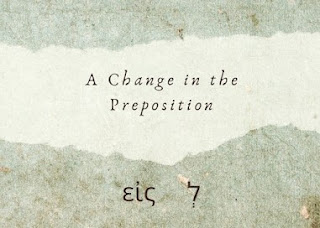A Change in the Preposition
We have all been there. In the depths of the valley, that
is. My own valleys include divorce, abuse, sickness and subsequent death of
close friends and family, financial instability, and traumatic accidents that
change the course of events. If you are human, you have experienced the deep
dark valley. I can remember screaming at God, asking “Why are you doing this to
me?” I am thankful for a God that allows me to question, have tantrums, and cry
out in anger. My God is gracious and forgives me when I place the blame in the
wrong direction.
The Bible is full of stories of other humans who have cried
out in anguish: Job in the depths of despair after losing his family and
possessions, David in the Psalms of written confession, the Israelites in the
wilderness crying out for food and water, Jesus’ disciples crying out to him
amid the storm. Even our Lord and Savior cried out to his Father from the
cross, “My God, My God, why have you forsaken me,” repeating the words of the
psalmist (Psalm 22).
Each person feels this during their lifetime. It could be
big or it could be small, but the crises happen.
I was talking with a couple recently who were amid a small
crisis. We talked about how we ask God, “why are You doing this to me?”
My friend in crisis thoughtfully said, “we really should ask, why are You doing
this for me?”
It is a change in the preposition. Not to, but for.
In Hebrew, the לְ (lamed-sheva)
is added to a noun or pronoun to show a relationship to another part of the
sentence. In Greek, the preposition εἰς, (eis) is used. The לְ (lamed-sheva) and the εἰς, (eis) have
the same meaning; “to, toward, for”. It is in the English that we decide which
prepositional word to use. “To” means ‘a direction toward an object’ and “for”
means ‘in the interest of; in the favor of’.
As you may have noticed the Hebrew and Greek prepositions do
not change, it is our English interpretation that changes. We decide if we
should say to or for. Is God doing this to us or for us?
Paul uses the preposition εἰς in Romans 8:28, “We know that all things work
together for good for those who love God, who are called according to
his purpose.” (NRSV) Notice also the translation says, “who are called
according to his purpose.” As we long for the good to come out of the bad and
we cry out in anguish, ask God “what is Your calling on my life through this
tragedy?”
I am not suggesting that we need to search for the reason
something has happened to us but instead allow ourselves to be open to the good
that can come from the bad. To search for the calling upon our lives instead of
the reason why something happened. When we change the preposition, we change
our view of God. It is not just a change in the preposition, it is a change in
our mindset.
When we believe that God is doing something to us, we
might see an angry, wrathful God who is sitting up in heaven zapping some and
blessing others. If we believe that God is doing something for us, we
have the image of a God who does this in our interest or in our favor.
The stories of a God who does things
for the favor of God’s people is written for us in the Scriptures.
Job was restored, David was forgiven, the Israelites were fed, and the storm
was calmed.
Finally, Jesus’ cry of dereliction as he gave up his life
was done for us and for our salvation. When you cry God, “Why are
you doing this for me?” know that God will answer, that God is gracious,
and that salvation through Jesus’ death and resurrection are for you.



Comments
Post a Comment